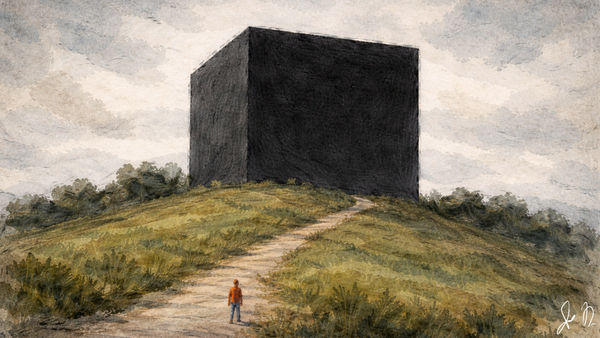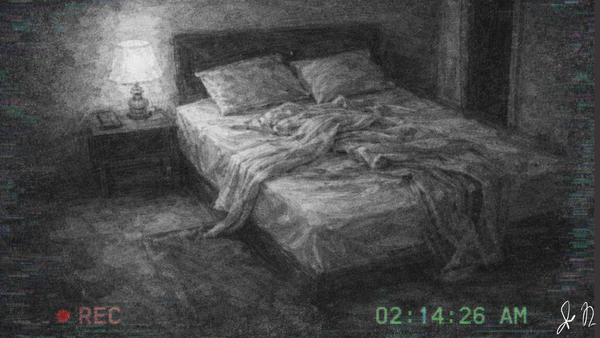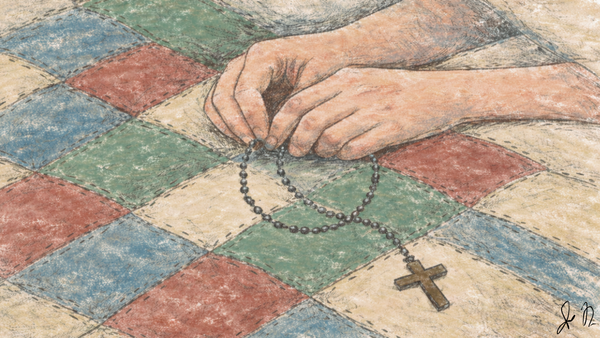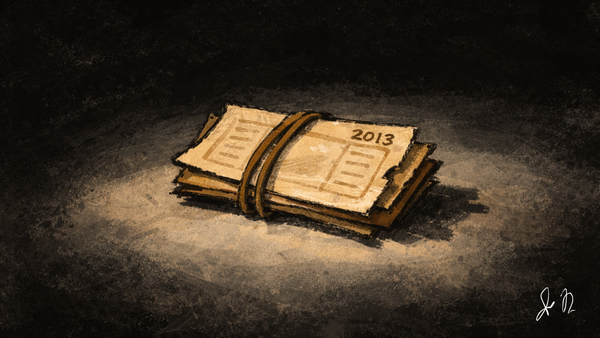Songs for the Dead and Drowning
A short tale of revenge, monsters, and the bleeding tides.
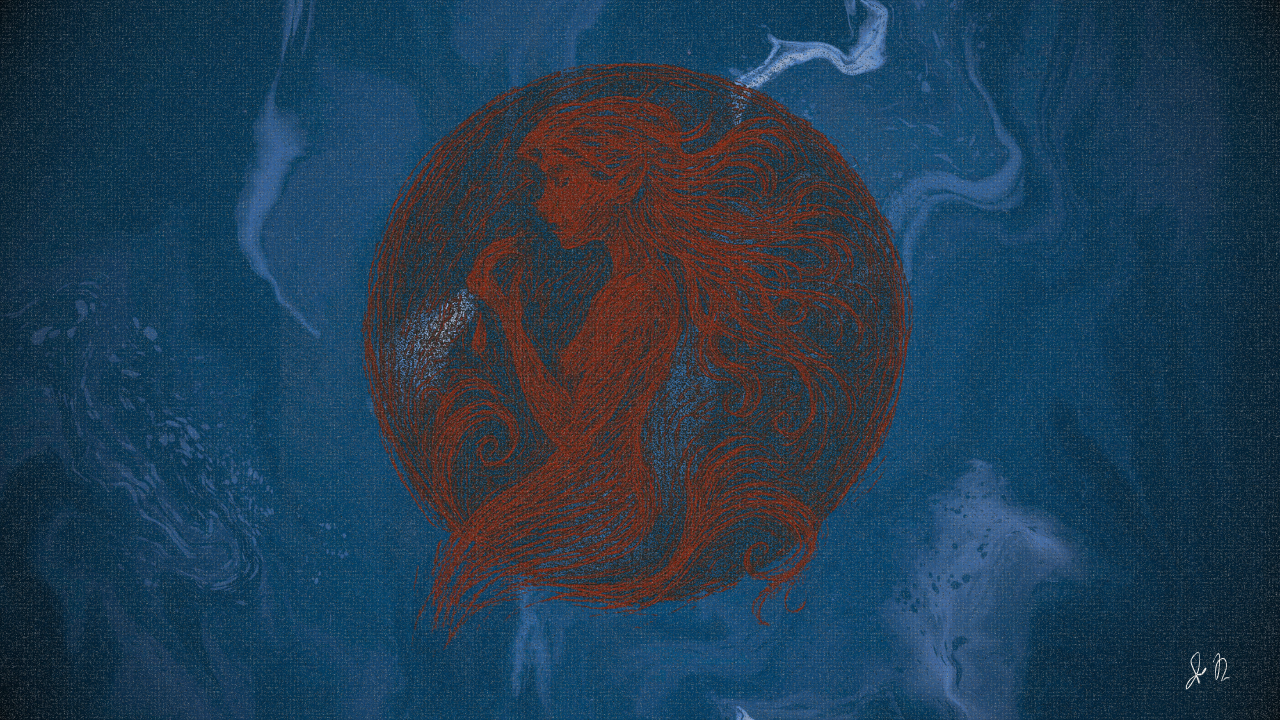
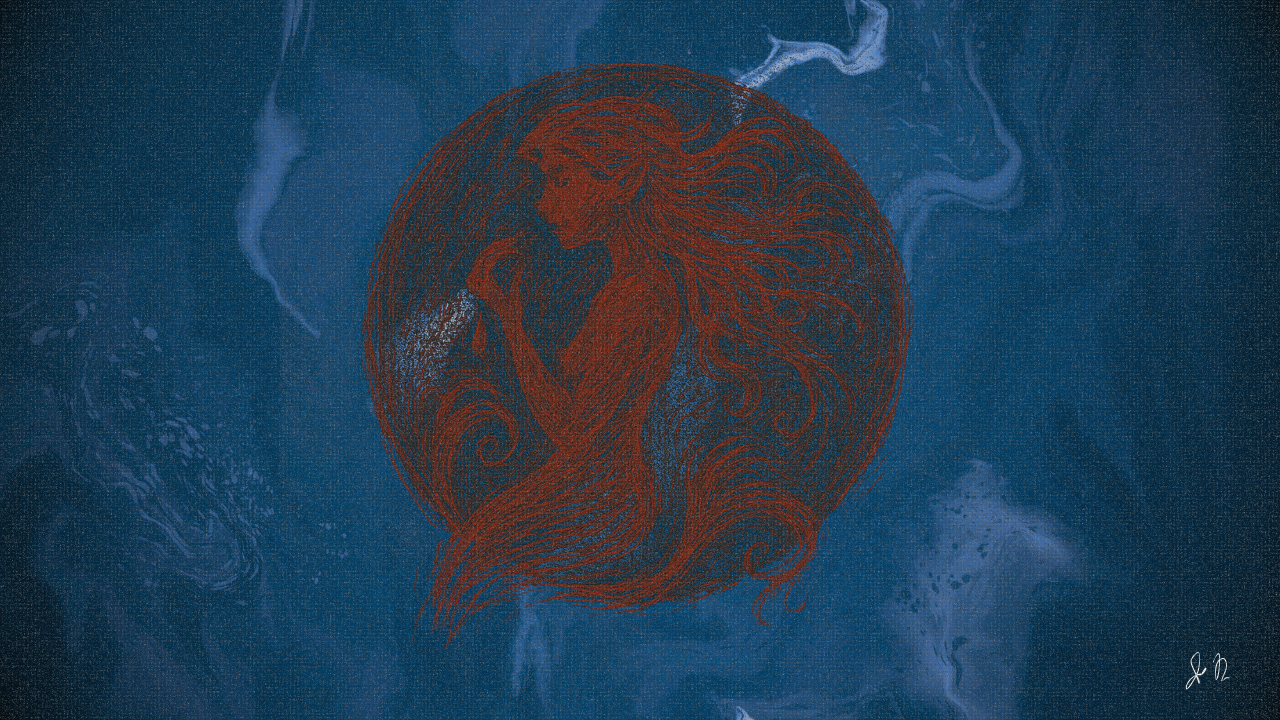
They’re tying the nets wrong. Again.
Sloppy work, all float and no weight. I watch from the reef, teeth bared in the foam, as their hooks snagg coral and nothing else. Their boat rocks with matched arrogance, too shallow for fish, too loud for ghosts. Men like that don’t really fish. They take.
The tall one spits a guava seed into the sea. I catch it on my tongue.
They don’t see me. They never do, not until the red starts blooming. Not until the smile, wide as a sandbar, comes crawling up out the waves with the body it belongs to. Not until the net pulls back empty, and they hear the first scream from the hull and know it was never theirs to cast.
Men used to ask for our siren songs.
Now they ask if we’re real. Real enough to kill them.
I was born in the trench they call La Boca de Yára, where the water is blacker than pitch and warmer than blood. My mother sang in the old words, the kind that could make ships crack open with fear. My father—if I had one—was probably a drowned god or worse, a jellyfish. I have her face, her knives, her fondness for necks.
I don’t keep a name. Names are for people who plan to be remembered. But the sailors who last long enough to gurgle something before they go under like to call me sirena. That’s cute. Sirena, like I might hum and blush and marry a gutted prince someday.
Call me that again and I’ll wear your jawbone like an anklet, I once told a sailor who meant me for purchase.
This part of the world, this bay choked with sun-bleached trade posts and rusted idols, they forget too quickly. They forget we tailed ones used to rule the tides with teeth sharper than storms. That we carved our homes from drowned cities before anyone could bother to notice them gone.
Now they set traps. Now they think themselves the hunters. How delicious.
Last season, one of theirs caught my songsister with a sugarcane spear. They strung her gills on a necklace and bragged about it in a tavern two harbors west if the gulls speak true. Said my sis was heavy as a manatee and twice as ugly. Said the meat was oily but good enough for dogs.
Well, after four tides, I’ve finally found the smelling man who told the story. Safe to say, he won’t be telling them stories long.
Tonight I smell rum on the air, but also piss and pissing gunpowder. A new crew’s made berth in the mangrove shallows down-tide from our monastery. I see them polishing harpoons. Not the kind for whales, mind you, but the kind for us tailed folk. One of them wears my songsister’s voice on his belt.
The sight makes me deathly hungry. The time for singing old words has passed into a time for hunting.
The moon sits fat as a stolen pearl in the sky. I surface beneath it as a wound splits open, slick with anticipation.
Their boat—a low-slung sloop with patched sails and piss-yellow lanterns—stinks of sweat and oil. Too many men for a hunt, too few for a war. Good. I don’t mean to rush dinner.
From the mangroves, I watch their laughter hack through the stillness. Boots clomp across planks. A machete scrapes sparks off an iron pot. One man pisses off the side to mark territory.
I would laugh, but I need my lungs at their fullest. Instead, I pull the bone hook from my belt and bite down. An instrument shaped from a thighbone. The owner of which is no longer able to protest its new purpose.
The tide obeys my request for stirring. It always does. I hiss to it softly and it rises with a curl and a shiver. The ropes tied to the dock go slack. The boat tilts a little too far starboard. That’s when they start cursing.
The first man dies with a curdling whisper, which disappoints me. He was young, all sunburn and peach fuzz, still drunk on the lie that the sea can be his. I split his neck from the shallows, drag him under before he can finish blinking. His blood unravels, turning violet in the moonlight.
The second man makes it to his feet before I drag him by the heel. His boot flips off in my hand. He hits the water face-first and surfaces screaming, so I crush his nose with the butt of my hook and feed him to the reef.
Three more. Then six. Then the deck goes full red with panic, and the gulls begin circling low, collecting information.
They fight back. Men always do. One manages to nick my arm with a harpoonhead and looks proud for half a heartbeat. I tear out his throat with a shark smile and let his pride gurgle on the planks.
They scream “witch,” “demon,” “sirena,” “puta.” I’ve been all four and worse. Words don’t stop these tides from bleeding.
I search for the last one, the one with the shell belt—her shells, my sister’s, split down the middle to fit his filth-rimmed hips—when I feel it.
A sting at my ribs. Then total black.
I wake to fire.
No, not fire. The harsh light of a lantern too close to my face. My wrists ache from coarse rope. Trawler gear, I think.
My head lolls, wet hair slapping the deck. I try to move but fail. Legs bound. Tail dry. Skin cracking. The pain comes in layers of peeling fruit.
I see him before long. The man who killed my songsister. He squats a few feet off, wiping blood from a long, curved blade. Not a machete but a gutting hook. Serrated like reefstone. The kind used for slicing out innards without damaging the pelt.
He looks about ninety, though legged ones age poorly, so who knows. Skin the color of churned clay, hair tied back with an old ribbon, shoulders heavy as ship rigging. He wears no shirt. Scars web across his chest. One eye milk-blind and the other a burning, bitter brown.
He glances at me with perverse interest. “Well now,” he says, voice like an anchor being dragged across gravel. “Aren’t you something.”
His teeth are far too clean for his face.
“Let me guess,” he continues. “You’re of relation to the one I gutted near Dos Caimanes. Aye, you’ve her same eyes.”
I hiss as sour blood bubbles in my throat.
“Don’t waste the air,” he says. “You’ll need it. I don’t plan to kill you.” He leans closer, breath warm with spiced rum. “Matter fact, I plan to keep you.”
It takes all of me to pretend fear. Because this fool thinks he’s won. That he’s netted something rare. That he can tame Sirena with firelight and cages. That I’ll curl up like a pretty shell and sing for him.
But I’m a predator with patience. I know how to play with my food. So I smile, cracked-lipped and bleeding, and let the hunger linger in my eyes.
He doesn’t know it yet, but he’s already dying.
He drags me above deck when the sun dies.
No fanfare or audience, as he doesn’t need one apparently. Strange, as most men do. He loops a cord around my neck—not tight, not gentle—and pulls me like his prize pig, my tail scraping hard wood. The barnacles chew at my scales. I give him nothing. Let him think me broken. Let him think wrong.
He drops me near the helm, coils the leash once around a cleat, and kneels like he’s done this thousands of times before. He has if the rope is honest. Knotted close, not clean. Done in a hurry. He wasn’t planning to bring me up tonight. Something changed. In him. Maybe he dreamt of me. Maybe he woke sweating, something twitching between his legs under some piss-damp blanket and he thought, why not now?
“I fed you,” he says, like that’s worth gratitude. “I cleaned your wounds.”
I look up to his eyes, the clouded pearl and the smoked brown. I spit in the middle of them.
He brushes his palm against my cheek and coils the fingers as if to mimic a fist. Like he’s testing meat for tenderness.
“You bite?” he asks.
Only when I’m not chewing.
He smiles. His teeth are straight. I wonder who he stole them from.
“You killed my entire crew,” he says. “Two were mine own cousins.”
You wear my sister on your belt, I sing in my head.
He notices I’m eyeing the shells, so he fingers them. One cracks slightly between thumb and nail.
“I heard your kind don’t weep,” he says.
We do. Just not for men.
He chuckles in the silence and sits back, resting his arms on knees. The rope tugs my neck when I shift. I don’t wince. He’s watching for that. His eyes drag across me. Down the shoulders, across the chest, past the gills. He stops at the scar on my flank, the one where his harpoon kissed bone.
“She begged,” he says. “The other one. When I opened her up. Not in words, since you animals can’t seem to use them mouths of yours. But her eyes did enough talking.”
I nod slowly.
He doesn’t understand my meaning nor does he care to. His eyes linger longer now with vain possession. Men like him want to own what they fear. Pin it, name it, tell stories over it. They don’t conquer for coin or freedom. They conquer so someone will say their name in the same breath as death. Yet he thinks himself someone special.
“You really do have her same eyes,” he says.
I don’t.
“But not her tongue.”
I let my mouth part. Just a little. Just enough for him to wonder what it might taste like.
“You’re not like the others,” he says.
I give him a questioning look meant only for him.
He stands. The rope tightens. His boot is near my tail.
I could snap his knee backward. Drag him overboard. Tear the soft bits before he yells. But he’s smart enough to carry the blade even now. The reef-hook sways at his hip, kissing his thigh. One mistake and he’ll carve me like he did her.
No. Not yet.
I shift my weight. Let the tail ripple in a tired way, nothing graceful or coy. He’s watching it. The way a butcher watches ribs to guess the fat.
“You’re cold,” he says. “I could bring a blanket.”
I eye the rope.
He grins. “Ah, you want me to loosen the rope so you can tear to my throat, is that it?”
I smile back.
He squats again, close this time. His breath is warm and rotten. His fingers brush the bone of my jaw, rough and slow.
“Maybe you’re smarter than she was,” he says. “Almost smart enough to talk.”
I flutter my eyes.
He grins again. “I do like you.”
Then he stands and turns away.
Doesn’t even bother to lock the line. Doesn’t notice the slack in the knot. He thinks I’m too weak to swim, too smart to try.
He’s right. For the moment.
I tuck the rope beneath my side, curl against the salt-stiff deck, and close my eyes. It won’t be long now. Every man breaks. Some with steel. Some with softness or the stiffness of old sleep. And some with a hand in the dark where they thought they were safe.
He’ll find that hand soon.
And when he does, I’ll make sure he remembers my name. Even if I never had one.
The hatch squeals open at the death of dusk.
He comes alone, lantern in one fist, a small cedar chest in the other. No sword, no gut-hook, not even a healthy fear. The fool tastes victory on his tongue and thinks it honey.
He kicks aside my rope without sparing them a glance. “Got you a gift,” he says, voice thick with lack of sleep. He sets the chest between us, eases up the lid.
Salt gleams inside. Coarse, red-tinged, and nestled in the brine rests a severed tongue, forked and pale, the edges curled like petals left too long in the sun.
My songsister’s last note.
“Pretty, isn’t it?” His good eye gleams. “Almost didn’t think to keep it. Makes for a better story than gills.”
Words clog my throat. Rage wants out—claws, fangs, everything. I swallow it down. Rage is for children. I need ice.
He rises, wipes sweat on his trousers, turns to fetch the lantern hook. That turn is all I require.
I slip the loosened rope, coil, and spring. My tail slams his knees; bone pops like green wood in a fire. He howls, topples, lantern clattering across the deck, coughing sparks. I land atop him—forearm across his windpipe, claws digging for pulse.
The ship tilts. Tar-soaked boards groan. A spark catches dried hemp. Flame crawls hungry along a pile of rope, licking toward the mast. Let it burn.
He thrashes, grabs my gills. I rake his blind eye—flesh peels, white jelly spilling. He screams, wet and high, more pig than man. The sound feeds me.
You wanted a story, I sing. Here’s the ending.
I wrench the broken lantern free, shatter the glass, pour hot oil over his chest. He wails his salt as his own tongue curls, smoke blooming black from his blood.
His hands reach for purchase but find none. I drag his steaming bones to the rail, every inch an aria of pain. The sea below yawns wide and dark for him, hungrier than me.
Tell the trench who sent you, I whisper.
He spits blood, as if understanding me. “S-sirena.”
Aye.
I shove him over. He falls crooked, one arm pin-wheeling, the other hugging what’s left of his cooked ribs as if that will hold the life in. Water swallows his sound. A single bubble breaks, then nothing returns .
I watch until the ripples flatten. The fire behind me catches the mainsail; heat prickles my back. Timbers crack. The ship will not see dawn.
I tip the cedar chest overboard, my sister’s tongue still inside. The sea accepts her final song.
Name? I still keep none. But the waves know me now. Know the sound of what they call me. The trench sings it in currents, the mangroves twist it through their roots, and every gull caws it in screams over the wreck that will carry the tale inland.
The sea remembers its own.
I slip over the rail, blades of flame dancing on the water’s skin, and dive for home while the ship burns to driftwood behind me.
Author’s Notes
Mermaids are a lie.
Not the creatures themselves, as those exist. You’ve met them, probably. In the dark, in the surf, at the edge of someone’s bed. Hungry, spectral, unbothered by your notions of the world.
No, the lie is how we’ve dressed them. We made them pretty. We made them sing. We made them long for love, for land, for legs. We flattened their teeth into pearls and gave them royalty arcs about sacrifice and young longing. What we did to mermaids is what we do to most wild things: we softened them until they sold well.
This story came from a refusal to keep softening. From a need to write a version of the sea that doesn’t always feel comfortable. A tale where the predator isn’t misunderstood, she’s correct. Where the monster doesn’t fall in love or feel bad for vengeance.
Songs for the Dead and Drowning is set in a world that borrows much from Taíno folklore, Caribbean waters, and all the anger that never fits neatly in a typically Western frame. A world that never once pretends the ocean is kind, because it isn’t. It’s as lethal as it is lush.
Sirena, the protagonist you just met, isn’t nice. She isn’t here to forgive or be told by some mentor “killing him will make you just as bad as him!” No, no, she’s here because someone hung her sister’s gills on a belt. She’s here to remind you that the sea, the environment itself, demands a price from those who try to own it.
This story is not subtle, I get it. It has some nasty claws and it knows where you sleep all that. But I hope, when you hear about mermaids again or see them on postcards and cereal ads and coffee cups, that you remember this version too. The one who bit back.
Jon Negroni is a Puerto Rican author based in the San Francisco Bay Area. He’s published two books, as well as short stories for IHRAM Press, The Fairy Tale Magazine, and more.
Support Cetera
Paid members get exclusive perks like bonus stories, the ability to comment, and more. Plus you'd be helping us keep the bills paid. You can check out the subscription tiers below, or you can leave a one-time tip if that works better for you.


